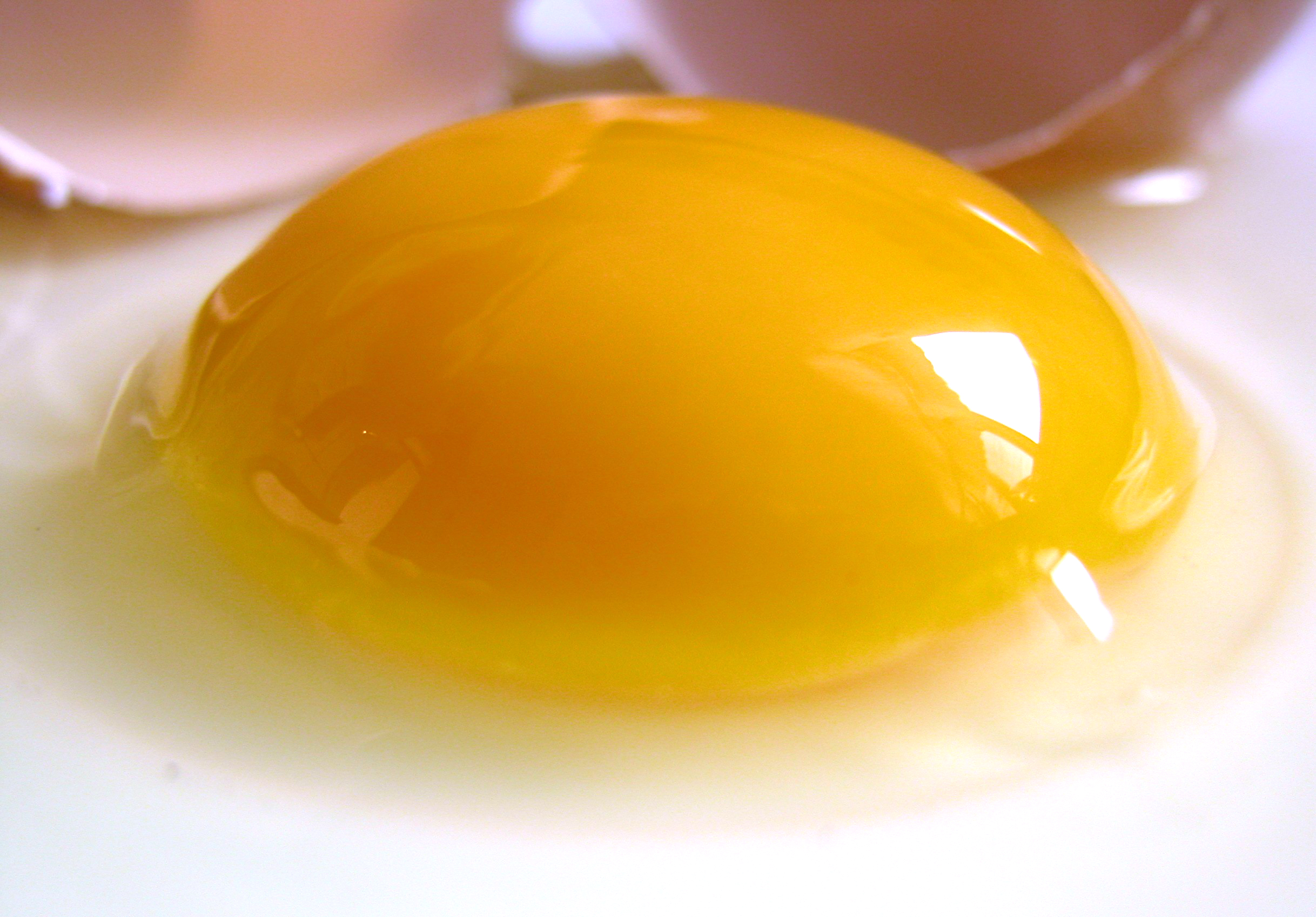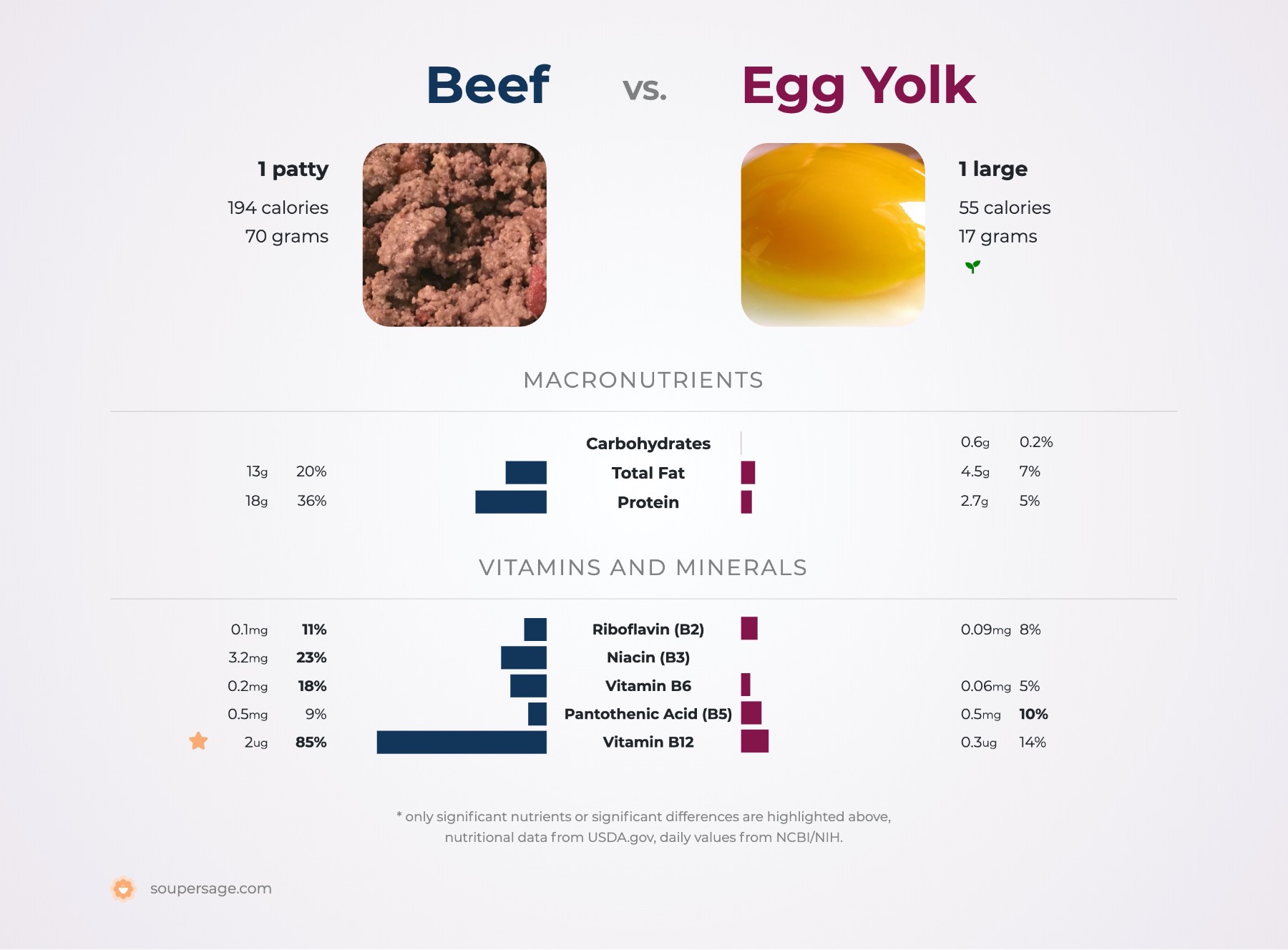Beef vs. Egg Yolk
Nutrition comparison of Cooked Beef and Egg Yolk
Ever wonder how your favorite foods stack up against each other in terms of nutrition?
We compared the nutritional contents of
cooked
beef
versus
egg yolk
(100g each)
below using 2020 USDA and NIH data[1].
For a quick recap of significant nutrients and differences in beef and egg yolk:
- Both beef and egg yolk are high in calories, iron, protein and saturated fat.
- Beef is a great source of potassium.
- Egg yolk has more thiamin, riboflavin, pantothenic acid and folate, however, beef contains more niacin.
- Egg yolk is an excellent source of Vitamin A, Vitamin D and calcium.
- For omega-3 fatty acids, egg yolk has more dha and epa than beef.
USDA sources for nutritional information: Beef (Beef, ground, 70% lean meat / 30% fat, patty, cooked, broiled) and Egg Yolk (Egg, yolk, raw, fresh) . Have a correction or suggestions? Shoot us an email.
Calories and Carbs
calories
Both beef and egg yolk are high in calories. Egg yolk has 16% more calories than beef - beef has 277 calories per 100 grams and egg yolk has 322 calories.
For macronutrient ratios, beef is heavier in protein, lighter in carbs and lighter in fat compared to egg yolk per calorie. Beef has a macronutrient ratio of 38:0:62 and for egg yolk, 20:5:75 for protein, carbohydrates and fat from calories.
Macro Ratios from Calories:
| Beef | Egg Yolk | |
|---|---|---|
| Protein | 38% | 20% |
| Carbohydrates | ~ | 5% |
| Fat | 62% | 75% |
| Alcohol | ~ | ~ |
carbohydrates
Both egg yolk and beef are low in carbohydrates - egg yolk has 3.6g of total carbs per 100 grams and beef does not contain significant amounts.
sugar
Egg yolk and beef contain similar amounts of sugar - egg yolk has 0.56g of sugar per 100 grams and beef does not contain significant amounts.
Protein
protein
Both beef and egg yolk are high in protein. Beef has 60% more protein than egg yolk - beef has 25.4g of protein per 100 grams and egg yolk has 15.9g of protein.
Fat
saturated fat
Both beef and egg yolk are high in saturated fat. Egg yolk has 30% more saturated fat than beef - beef has 7.3g of saturated fat per 100 grams and egg yolk has 9.6g of saturated fat.
trans fat
Egg yolk has less trans fat than beef - beef has 1.2g of trans fat per 100 grams and egg yolk does not contain significant amounts.
cholesterol
Egg yolk is high in cholesterol and beef has 92% less cholesterol than egg yolk - beef has 88mg of cholesterol per 100 grams and egg yolk has 1085mg of cholesterol.
Vitamins
Vitamin A
Egg yolk is an excellent source of Vitamin A and it has 126 times more Vitamin A than beef - beef has 3ug of Vitamin A per 100 grams and egg yolk has 381ug of Vitamin A.
Vitamin D
Egg yolk is an excellent source of Vitamin D and it has 108 times more Vitamin D than beef - beef has 2iu of Vitamin D per 100 grams and egg yolk has 218iu of Vitamin D.
Vitamin E
Egg yolk has 20 times more Vitamin E than beef - beef has 0.12mg of Vitamin E per 100 grams and egg yolk has 2.6mg of Vitamin E.
Vitamin K
Beef and egg yolk contain similar amounts of Vitamin K - beef has 3ug of Vitamin K per 100 grams and egg yolk has 0.7ug of Vitamin K.
The B Vitamins
Egg yolk has more thiamin, riboflavin, pantothenic acid and folate, however, beef contains more niacin. Both beef and egg yolk contain significant amounts of Vitamin B6 and Vitamin B12.
| Beef | Egg Yolk | |
|---|---|---|
| Thiamin | 0.051 MG | 0.176 MG |
| Riboflavin | 0.176 MG | 0.528 MG |
| Niacin | 4.537 MG | 0.024 MG |
| Pantothenic acid | 0.658 MG | 2.99 MG |
| Vitamin B6 | 0.336 MG | 0.35 MG |
| Folate | 11 UG | 146 UG |
| Vitamin B12 | 2.9 UG | 1.95 UG |
Minerals
calcium
Egg yolk is an excellent source of calcium and it has 269% more calcium than beef - beef has 35mg of calcium per 100 grams and egg yolk has 129mg of calcium.
iron
Both beef and egg yolk are high in iron. Egg yolk has 21% more iron than beef - beef has 2.3mg of iron per 100 grams and egg yolk has 2.7mg of iron.
potassium
Beef is a great source of potassium and it has 152% more potassium than egg yolk - beef has 275mg of potassium per 100 grams and egg yolk has 109mg of potassium.
Omega-3 and Omega-6
omega 3s
For omega-3 fatty acids, egg yolk has more DHA and EPA than beef per 100 grams. Both beef and egg yolk contain significant amounts of alpha linoleic acid (ALA).
| Beef | Egg Yolk | |
|---|---|---|
| alpha linoleic acid | 0.056 G | 0.103 G |
| DHA | ~ | 0.114 G |
| EPA | ~ | 0.011 G |
| Total | 0.056 G | 0.228 G |
omega 6s
Comparing omega-6 fatty acids, egg yolk has more linoleic acid than beef per 100 grams.
| Beef | Egg Yolk | |
|---|---|---|
| other omega 6 | 0.047 G | 0.438 G |
| linoleic acid | 0.39 G | 3.538 G |
| Total | 0.437 G | 3.976 G |
Customize your serving size
The comparison below is by weight, but sometimes 100g isn't that intuitive of a measurement for food. View a custom portion comparison (e.g. cups, oz, package).
You can try adding or subtracting the amount of either Beef or Egg Yolk .
Cooked Beef 100g
(
100 g
)
|
Daily Values (%) |
Egg Yolk 100g
(
100 g
)
|
|||||
|---|---|---|---|---|---|---|---|
| 277KCAL 14% |
|
5% | calories | 16% |
|
322KCAL 16% | |
|
|
5% | carbohydrates | >999% |
|
3.6G 1% | ||
| 5% | sugar | >999% | 0.56G | ||||
| 19G 29% |
|
5% | total fat | 42% |
|
27G 42% | |
| 7.3G 41% |
|
5% | saturated fat | 32% |
|
9.6G 53% | |
| 8.9G | 5% | monounsaturated fat | 35% | 12G | |||
| 0.49G | 5% | polyunsaturated fat | 757% | 4.2G | |||
| 1.2G | >999% | trans fat | 5% | ||||
| 88MG | 5% | cholesterol | >999% | 1085MG | |||
| 81MG 5% |
|
69% | sodium | 5% |
|
48MG 3% | |
| 5% | Vitamins and Minerals | 5% | |||||
| 3UG 0.4% |
|
5% | Vitamin A | >999% |
|
381UG 54% | |
| 2IU 0.4% |
|
5% | Vitamin D | >999% |
|
218IU 44% | |
| 35MG 4% |
|
5% | calcium | 269% |
|
129MG 13% | |
| 2.3MG 13% |
|
5% | iron | 17% |
|
2.7MG 15% | |
| 19MG 6% |
|
280% | magnesium | 5% |
|
5MG 2% | |
| 275MG 12% |
|
152% | potassium | 5% |
|
109MG 5% | |
| 0.05MG 5% |
|
5% | thiamin (Vit B1) | 259% |
|
0.18MG 16% | |
| 0.18MG 16% |
|
5% | riboflavin (Vit B2) | 194% |
|
0.53MG 48% | |
| 4.5MG 32% |
|
>999% | niacin (Vit B3) | 5% |
|
0.02MG 0.2% | |
| 0.34MG 26% |
|
5% | Vitamin B6 | 3% |
|
0.35MG 27% | |
| 0.66MG 13% |
|
5% | pantothenic acid (Vit B5) | 354% |
|
3MG 60% | |
| 11UG 3% |
|
5% | folate (Vit B9) | >999% |
|
146UG 37% | |
| 2.9UG 121% |
|
45% | Vitamin B12 | 5% |
|
2UG 81% | |
| 0.12MG 1% |
|
5% | Vitamin E | >999% |
|
2.6MG 17% | |
| 3UG 3% |
|
329% | Vitamin K | 5% |
|
0.7UG 1% | |
| 25G 51% |
|
56% | protein | 5% |
|
16G 32% | |
| 78MG 18% |
|
5% | choline | 951% |
|
820MG 193% | |
| 0.07MG 6% |
|
5% | copper | 14% |
|
0.08MG 6% | |
| 0.01MG 1% |
|
5% | manganese | 495% |
|
0.06MG 3% | |
| 185MG 26% |
|
5% | phosphorus | 111% |
|
390MG 56% | |
| 22UG 39% |
|
5% | selenium | 155% |
|
56UG 102% | |
| 6.1MG 77% |
|
165% | zinc | 5% |
|
2.3MG 29% | |
| 56G | 8% | Water | 5% | 52G | |||
NO SIGNIFICANT AMOUNTS (either food): Starch, Alcohol, dietary fiber, chlorine, chromium, fluoride, iodine, molybdenum, Vitamin C, biotin (Vit B7). |
|||||||
FAQ
Does beef or egg yolk contain more calories in 100 grams?Both beef and egg yolk are high in calories. Egg yolk has 20% more calories than beef - beef has 277 calories in 100g and egg yolk has 322 calories.
Is beef or egg yolk better for protein?
Both beef and egg yolk are high in protein. Beef has 60% more protein than egg yolk - beef has 25.4g of protein per 100 grams and egg yolk has 15.9g of protein.
Does beef or egg yolk contain more calcium?
Egg yolk is a rich source of calcium and it has 270% more calcium than beef - beef has 35mg of calcium in 100 grams and egg yolk has 129mg of calcium.
Does beef or egg yolk contain more iron?
Both beef and egg yolk are high in iron. Egg yolk has 20% more iron than beef - beef has 2.3mg of iron in 100 grams and egg yolk has 2.7mg of iron.


